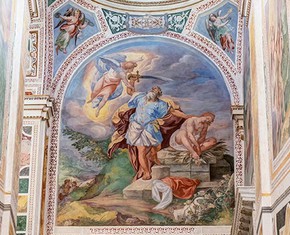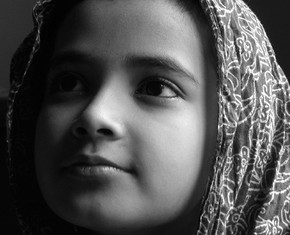The views expressed in our content reflect individual perspectives and do not represent the authoritative views of the Baha'i Faith.
In the beginning the tree was in all its beauty, and full of blossoms and fruits, but at last it became old and entirely fruitless, and it withered and decayed. This is why the True Gardener plants again an incomparable young tree of the same kind and species, which grows and develops day by day, and spreads a wide shadow in the divine garden, and yields admirable fruit. So it is with religions; through the passing of time they change from their original foundation, the truth of the Religion of God entirely departs, and the spirit of it does not stay; heresies appear, and it becomes a body without a soul. That is why it is renewed. – Abdu’l-Baha, Some Answered Questions, p. 165.
OK, let’s try a little audience participation at the beginning of this article: who out there in the BahaiTeachings.org audience grew up with a religion? Please raise your hands.
Now, dear readers, let’s see a show of hands for those who currently have an active religious practice. C’mon, get those hands up…
Not as many? Well, the pollsters agree, that’s the way it usually goes in the modern age.
Quite a few of us—almost four-fifths of all adults around the world—grew up within a religious tradition of some kind. Normally, in the past, people inherited their belief system from their parents, who passed it down by training us to believe and behave as they did.
That left the grown children of religious parents with these four basic choices:
- Fully accept and practice their parents’ religion
- Try to practice it, but eventually, for lack of commitment or belief, let it go
- Reject their parents’ religion, and look for a new Faith
- Or finally, reject their parents’ religion and, in the process, reject all religion.
The majority of the world’s population tends toward number 1 or number 2—but polls done in dozens of countries around the world have shown a marked increase in the number of people deciding to follow the more independent paths described in number 3 or number 4.
One recent international survey called “Beliefs about God Across Time and Countries” conducted by the University of Chicago showed that, in general, belief in God and adherence to a religion has declined over time.
Baha’u’llah, the prophet and founder of the Baha’i Faith, predicted that trend a century and a half ago, when he said “The vitality of men’s belief in God is dying out in every land; nothing short of His wholesome medicine can ever restore it.” – Gleanings from the Writings of Baha’u’llah, p. 199.
 Baha’is firmly believe that the time for a complete renewal of religion has arrived. The discredited ecclesiastical hierarchies of Christianity and Islam, the ascendancy of scientific knowledge, the rise of skepticism and disbelief, the vicious warfare and violence condoned and even encouraged by various “religious” groups—all have combined to convince a growing number of people that religion itself has reached the end of its useful life.
Baha’is firmly believe that the time for a complete renewal of religion has arrived. The discredited ecclesiastical hierarchies of Christianity and Islam, the ascendancy of scientific knowledge, the rise of skepticism and disbelief, the vicious warfare and violence condoned and even encouraged by various “religious” groups—all have combined to convince a growing number of people that religion itself has reached the end of its useful life.
But historically, when periods of disbelief, estrangement and religious decline have reached their lowest point, a new Faith has always appeared.
That eternal cycle of decline and renewal has played its part in the birth of every major Faith. In Judaism, in Buddhism, in Islam, in Christianity, a new messenger and prophet appeared, always when the fortunes of society had reached their lowest ebb. The previous religions had each devolved into sectarianism, conflict and open hostility. The progress of civilization had waned. The collective spirituality of the entire culture had deteriorated. The light of the lamp of God was almost quenched. Then, metaphorically, a new day dawns:
…the Sun of Reality, when it illumines the horizon of the inner world, animates, vivifies and quickens with a divine and wonderful power. The trees of human minds clothe themselves in new and verdant robes, putting on leaves and blossoms and bearing spiritual fruits of the heavenly glad tidings. Then fragrant flowers of inner significances appear from the soil of human souls, and the whole being of man awakens to a new and divine activity. This is the growth and development of the inner world through the effulgent light of divine guidance and the heat of the fire of the love of God.
The physical sun has its rising and its setting. The earthly world has its day and its night. After each sunset there is a sunrise and the coming of a new dawn. The Sun of Reality, likewise, has its rising and setting. There is a day and a night in the world of spirituality. After each departure there is a return and the dawning light of a new day. – Abdu’l-Baha, The Promulgation of Universal Peace, p. 271.
Once we understand the dynamics of this process, we can begin to see why people become disenchanted with their parents’ religions and leave their traditions behind. If those traditions have lost their inner significance, their meaning, their vitality—why would people continue to follow them?
We can also begin to see what motivates others to embark on a spiritual search, to look for something that gives their lives meaning and purpose and enlightenment.
The Baha’i teachings say religion is a single organic system that requires periodic renewal—which offers an enormous amount of hope to those who independently search for their own truth. Those progressive teachings ask us to understand religion as one evolving process, rather than as a fixed and dogmatic event that happened once in the distant past. They gently awaken us and ask us to look out at a new dawn.
















Comments
Sign in or create an account
Continue with Googleor